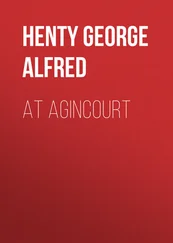“I am very glad to hear it,” Guy said. “He is a low scoundrel, and though I say not but that the information obtained from him may have been of some advantage, for indeed it was the means of my being enabled to save our lives and those of my Burgundian friends, I like not the thought of your going to meet him; and I am sure that if he were to take the idea into his thick head that it was not for the advantage of the Duke of Burgundy that the information he had given was being used, he is capable of denouncing you.”
“I did not mind meeting him,”, the girl said. “I never went into the rough quarters, but always met him in one of the better squares or streets. Still, I am glad that I have not to go again. I think that he had been drinking all night, and with his unwashed face and his bloodshot eyes and his foul attire I was ashamed even in my present dress to speak with him.”
“I hope that I have done with him too,” Guy said. “Of course, for my mistress's sake, I shall go again if there be aught to be learnt by it, but as it seems he is now no longer to be trusted it is not likely that any advantage is to be gained by visiting him. However, I shall hear what your father thinks this evening.”
Upon talking over the matter with the astrologer the latter at once said that he thought that it would be better for him not to go to Simon's again.
“When he finds that my daughter meets him no more he will feel aggrieved. I myself shall go in disguise to-morrow to meet him in the Place de Greve, and tell him that for the present there will be no occasion for him to come to the rendezvous, as the events of the meeting which will have taken place before I see him show that there can be no doubt that the butchers are ready to go all lengths against the Orleanist party; but that if any change should occur, and private information be required, you would go to his lodging again, I shall make no allusion to his having given me none of the names save those furnished by the duke, or remark on the strangeness that, having been at the meeting, he should have heard nothing of the measures proposed against the others; his own conscience will no doubt tell him that his failure is one of the causes of my no longer desiring any messages from him. I have other means of gaining information, as I have one of the medical students who follow that cracked-brained fellow, John de Troyes, in my pay. Hitherto I have not employed him largely, but shall now, if need be, avail myself of his services. But I do not think that I shall have any occasion to do so. After the demand by the Parisians for so many nobles and gentlemen to be arrested, it will be clear to all adhering to Orleans that Paris is no longer a place for them, and even the followers of Burgundy will see that those the duke regarded as his servants have become his masters, and there will be but few persons of quality remaining in Paris, and therefore, save when some citizen wishes to consult me, I shall have little to do here save to carry on my work as a quack outside the gates. Even this I can drop for a time, for the people of Paris will not be inclined for pleasure when at any moment there may be fierce fighting in the streets. I shall be well content to look on for a time. I have been almost too busy of late. And it was but yesterday that I received news from a Carthusian monk,—whom I thought it as well to engage to let me know what is passing,—that there have been debates among some of the higher clergy upon reports received that persons, evidently disguised, call upon me at late hours, and that I practise diabolic arts. A determination has been arrived at that an inquisition shall be made into my doings, my house is to be searched, and myself arrested and tried by the judge for having dealings with the devil. This news much disturbed me; however, when you told me that the Archbishop of Bourges was among those on the list of accused, and also Boisratier, confessor to the queen, it is evident that these good ecclesiastics will have ample matter of another sort to attend to, and are not likely to trouble themselves about sorcery at present.”
On the following morning some twelve thousand White Hoods marched to the Hotel de St. Pol, and the leaders, on being admitted, found all the great lords assembled. After making various propositions they presented a roll to the Duke of Aquitaine containing the names of those they charged with being traitors. He at first refused to take it; but so many of their followers at once poured into the great hall that he was obliged to do so, and to read out the names. Twenty of those mentioned in the list were at once, in spite of the protest of the duke, arrested and carried off; a proclamation was made by sound of trumpet in all the squares of Paris summoning the other forty named to appear within a few days, under penalty of having their property confiscated. A week later the king, having recovered his health, went to the church of Notre Dame, he and all the nobles with him wearing white hoods. Four days later the Parisians rose again, seized the gates, drew up the bridges, placed strong guards at each point, and a cordon of armed men outside the walls all round the city, to prevent any from escaping by letting themselves down from the walls.
Parties of ten armed men were placed in every street, and the sheriffs and other leaders marched a large body of men to the Hotel de St. Pol and surrounded it by a line three deep. They then entered and found the king, dukes, and nobles all assembled in the great hall.
They then ordered a Carmelite friar, named Eustace, to preach to the king. He took for his text, “ Except the Lord keep the city, the watchman waketh but in vain ,” and upon this discoursed on the bad state of the government of the kingdom, and of the crimes committed. The Chancellor of France demanded of the friar when he had concluded who were those who had incited him thus to speak, and the leaders at once said they had done so, and called up a number of other leaders, who on bended knees declared to the king that Father Eustace had spoken their sentiments; that they had the sincerest love for the king and his family, and that what they had done had been for the welfare of himself and the kingdom. While this was going on, the Duke of Burgundy, at once indignant and alarmed at this insolence of the Parisians, had gone out, and, finding the lines of armed men surrounding the hotel, had earnestly entreated them to retire, saying that it was neither decent nor expedient that the king, who had but just recovered from his illness, should thus see them drawn up in battle array round his abode. Those he addressed replied like the leaders within, that they were there for the good of the kingdom, and then gave him a roll, saying that they should not depart until those written on it were delivered up to them.
With the names of Louis of Bavaria, five knights, an archbishop and priest, were those of nine ladies of high rank, including the eldest daughter of the constable. The duke found that neither his authority nor powers were of the slightest avail, and returning to the queen, showed her the list. She was greatly troubled, and begged him to go with the Duke of Aquitaine and beg the Parisians in her name to wait for eight days, and that she would at the end of that time allow them to arrest her brother. The two dukes went out to the Parisians, but they positively refused to grant the request, and declared that they would go up to the queen's apartments and take those named by force, even in her or the king's presence, unless they were given up. On their return to the queen they found Louis of Bavaria and the king with her. On their report of the Parisians' demands the Duke of Bavaria went out and begged them to take him into custody, and that if he were found guilty they could punish him, but that if found innocent he should be allowed to go back to Bavaria, under a promise not to return to France again. He begged them to be content with taking him a prisoner, and to arrest no others.
Читать дальше












